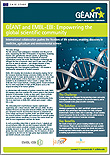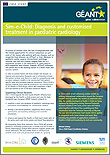Bio-Medical Sciences
Introduction
The bio-medical sciences aim to study the principles that govern the function of the human body, discover the mechanisms of disease, and find innovative ways to treat or cure illnesses.
The bio-medical sciences have been transformed by the digital age. The use of technology means that more and more detailed information is now available to doctors and researchers from a wider variety of sources, ranging from specialist patient medical scans to maps of genomes – the building blocks of life.
Sharing data around the world
This increase in knowledge is driving three major trends. Firstly, scientists and doctors need to share greater amounts of data with colleagues across the world, collaborating together to both make more informed diagnoses and to deepen research in areas as diverse as finding cures for diseases or studying genetic similarities amongst different populations.
Secondly, researchers can now access, compare and analyse a complete range of different information sources and databases to correlate their own findings. These might be in related fields or simply provide more data when studying rarer diseases.
Finally, the scale of bio-medical science experiments means that it is often impossible to carry them out cost-effectively in a single location. Research is a truly global collaboration, involving a wide range of participants from the academic and commercial worlds.
The impact of research and education networks
Creating, handling and benefiting from these growing volumes of data requires the power of research and education networks. The size of individual data files mean that they cannot be transmitted cost-effectively across the commercial internet and need high capacity, high speed research networks such as GÉANT to provide the secure, reliable performance to enable real time collaboration.
As projects have become more complex and global they span multiple regions, and GÉANT’s global links underpin seamless worldwide transmission of data, combined with services that are designed to meet bio-medical researchers’ specific needs.
The processing power required for bio-medical research could make it difficult for smaller organisations, such as hospitals to benefit from access to this rapidly growing store of information. To prevent this grid infrastructures that combine large numbers of high performance computers have been developed which provide the massive processing power needed for research and analysis, removing complexity and IT costs from individual organisations. Grids rely on high speed research networks to link their geographically spread computing resources for real time data transfer without bottlenecks.
Click here for more details and case studies on some of the leading global projects that GÉANT is involved with:

.jpg)



